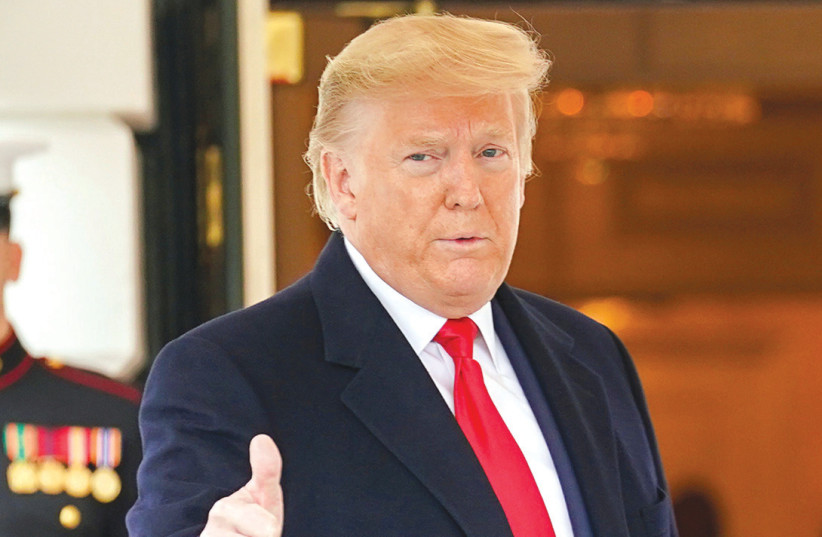Gaza water and energy projects in the “deal of the century” could be implemented immediately, for everyone’s benefit
YOSEF I. ABRAMOWITZ / THE MEDIA LINE
FEBRUARY 26, 2020 01:33

WASHINGTON, DC—President Donald Trump’s Peace to Prosperity plan for the Palestinians is the most serious attempt to articulate what a final status solution could look like. Yes, it is flawed in many ways. But for a president who doesn’t want to replicate the failures of his predecessors, he is about to make the same classic mistake former president Barack Obama made: namely, waiting to get agreement on all key issues and from all parties before implementing.
When Vice President Mike Pence addresses AIPAC next week, the 18,000-strong pro-Israel lobby gathering in Washington, DC for their annual Policy Conference, there are many applause lines he can predictably count on from Trump’s plan. Jerusalem, disarming Hamas, annexation of territory and more. But he could also use that platform to break with Obama and announce that the president is immediately implementing the section of the “deal of the century” on energy and water for Gaza.
Given the dismal state in Gaza of wastewater management because of lack of power, it is on President Trump’s watch that a cholera outbreak or worse in Gaza is possible, that could also jump the fence to Egypt and Israel. Also, with 98% of the Gaza aquifer undrinkable, the region is heading soon into blistering summer months with greater thirst, suffering and hunger and therefore primed for greater radicalization during the US presidential election. In other words, Gaza could be an explosive liability for a sitting president or, conversely, an opportunity.
The Trump plan for Gaza has sections dealing with energy and water, with even very specific line items budgeted that, if implemented, both sides of the aisle in Congress would appreciate, as would a majority of Palestinians and Israelis.
In phase one of the energy plan, there is $12 million in grant funds for repairing the cross-border transmission lines from Egypt, $40 million in grants to increase revenue collection by installing prepaid meters, a $44 million grant to construct a high voltage 161-kilovolt line from Israel to Gaza, and $50 million in project finance for independent mini-grids for schools, hospitals, universities and industry. Most significantly, there is $150 million in project finance for 100 megawatts of solar fields and rooftop installations but the plan inexplicably left out the $5 million in grants that would be necessary to leverage the larger project finance funds.
There are parts of the energy plan that should not be implemented: namely, increasing diesel generators, storage tanks and fuel, even short-term. That earmarked $15 million should go instead into a series of scalable pilot programs, like the one announced last week in Gaza that uses Israeli technology to pull water out of the air, powered by a 10-kilowatt solar system. There is endless water available to Gazans in the humid coastal air but to remove it for drinking is energy intensive. The pilot, developed by a consortium of Palestinian NGOs, WaterGen and the Arava Institute for Environmental Studies, could be franchised by young entrepreneurs to 500 locations within a year – each location supplying 800 liters of drinkable water a day. Redirecting the $15 million from diesel to franchise this water-energy pilot would also get applause at the AIPAC Policy Conference.
The surprising positive actor open to the most creative energy and water solutions is the Israeli military, which has sounded the humanitarian alarm about Gaza’s deterioration and is an eager partner to have the international community not just pledge funds but actually do something.
Most of the financial pledges for energy and water made by the international community have been directed toward the slow-moving World Bank. The problem with the well-intentioned good people at the World Bank dealing with Gaza is that they have only two solutions: emergency relief being thrown off trucks or grandiose infrastructure schemes that will take years, if ever, to be built. The Trump plan recognizes the need to unleash the creative potential of the Palestinian people for economic development, which should mean spurring small and medium businesses in the energy and water sector. The World Bank should take this approach as well.
An earlier unpublished draft of the plan included a major industrial zone in Sinai next to Gaza. The vision was that day passes could be arranged for Gazans to work there, with the zone anchored by a 50-megawatt solar field, a desalination plant, factories and more. The advantages of locating major infrastructure for Gaza outside of Gaza meant that it would not be exploited by Hamas from which to launch rockets nor targeted by the Israelis in retribution for rocket launches. There is also the question of space. Sinai has nearly infinite land, while Gaza is severely limited in space. The Egyptians often would hint that they could live with this but ultimately balked because they didn’t want to seem as if they are assuming any responsibility for Gaza and also because they feared the industrial zone would be a magnet for attacks by ISIS-allies, who are active in Sinai.
While the media and politicians have been focused on the political dynamics around the “deal of the century,” no one has yet noticed that it includes along the Egyptian border on the Israeli side a Gaza-linked corridor for an industrial zone and more. Because there is no sea link, only the desalination plant couldn’t be located there but the other aspects of the Sinai industrial zone can move forward within Israel, with or without a deal.
Understanding the difference between all-or-nothing dealmaking and statesmanship is key. It is time for the president to courageously implement the Gaza water and energy projects from the plan bearing his name.
For more stories, go to the themedialine.org
Content retrieved from: https://www.jpost.com/International/Donald-Trump-AIPAC-and-the-Gaza-opportunity-618824.